In Sweats or Suits, Graduate Students Embrace the Remote PhD Dissertation Defense
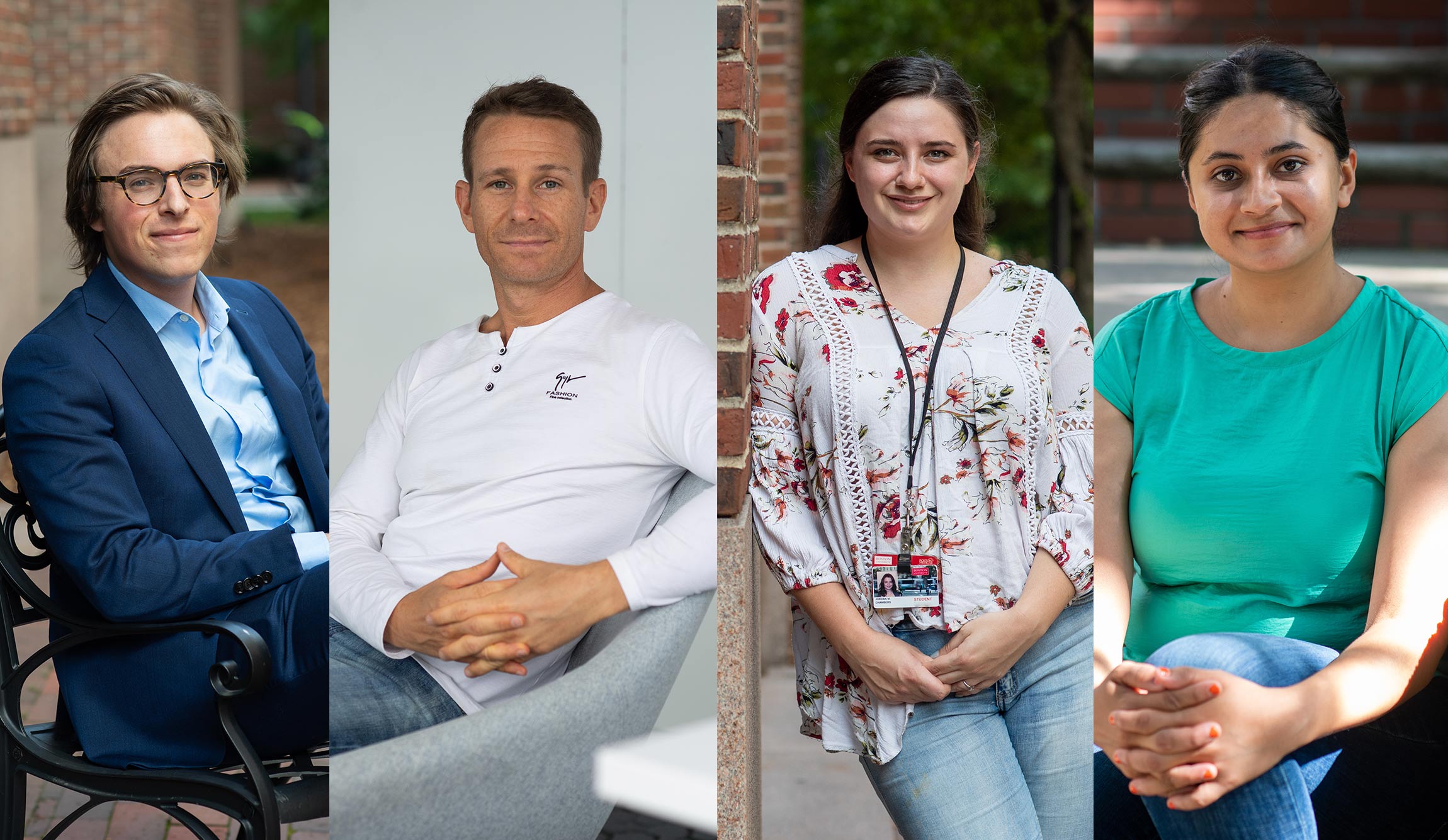
Richard Giadone (MED’20) (from left), Adam Vogel (MED’20), Jordan Chambers (MED’20), Fatima Aqeel (GRS’20), and Kyle Pedro (MED’20) (not pictured) successfully defended their PhD dissertations remotely, via Zoom.
In Sweats or Suits, Graduate Students Embrace the Remote PhD Dissertation Defense
As they present from their kitchens, living rooms, and bedrooms, friends and family tune in from around the world via Zoom
Adam Vogel always pictured himself defending his PhD neuroscience dissertation at Boston University in a room filled with faculty, classmates, friends, and family, and afterward, his mentors toasting him at a party. Instead, he sat alone, in the middle of the night, clicking on a Zoom link from his Airbnb in a high-rise outside sweltering Manila, where he’d gone on spring break only to be marooned for months by the Philippines’ nationwide COVID-19 lockdown.
When it was over, recalls one of his mentors, Shelley Russek, director of the Graduate Program for Neuroscience, who had beamed in from Boston (12 time zones behind the Philippines) for the defense, “I extended my hand—virtually—and said, ‘Congratulations, Dr. Vogel, you did it.’”
That, and a round of clapping hands emojis from the other members of the dissertation committee, was the party for Vogel (MED’20).
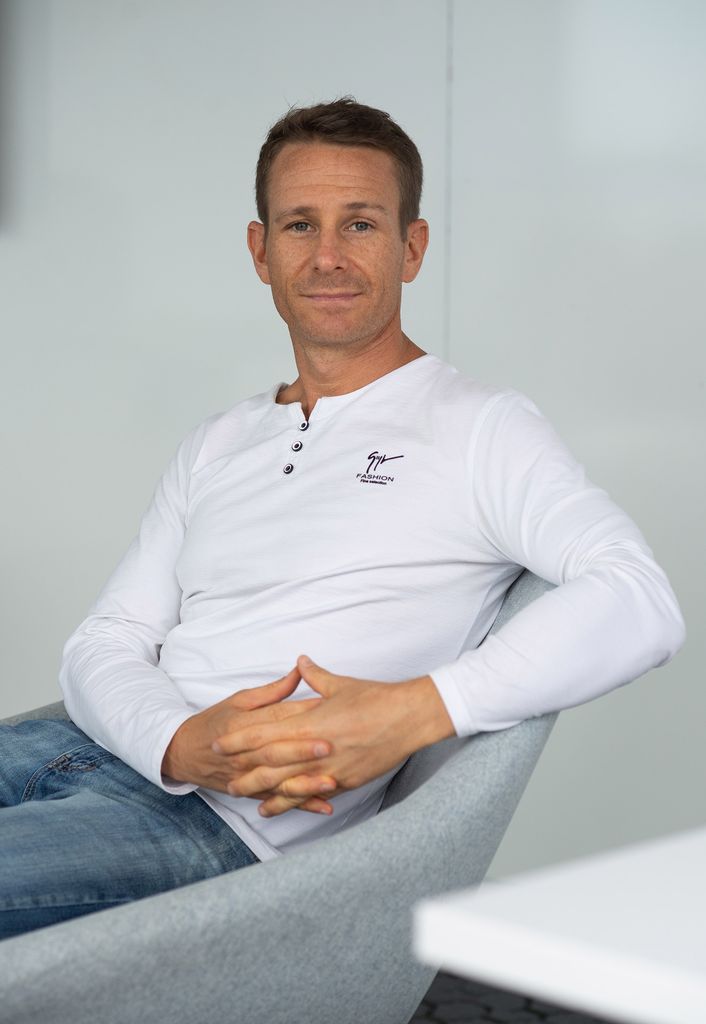
“Adam was the first one [at BU] to Zoom his defense,” says Russek (MED’94), a School of Medicine professor of pharmacology and experimental therapeutics. “We were all nervous about it.” Afterward, offline, she was so spent emotionally from worrying about Vogel and how the remote presentation would work, she says, “I cried.”
That was March 30. Four months later, as Russek says, the virtual dissertation defense at BU, and at universities across the country, has become routine. In fact, thanks to the accessibility that comes with Zoom, the remote academic dissertation defense has become a hot ticket. Friends and family members are tuning in from around the world. Vogel estimates 40 to 60 people showed up online for his presentation, “A tool for the in vivo gating of gene expression in neurons using the co-occurence of event-driven neural activity and light.”
“Some students will take it as if it’s Broadway,” Russek says. “They’re in front of the camera, all eyes are on them.”
Like so many other aspects of the COVID-19–imposed virtual world, the online PhD defense presents obstacles along with some unexpected benefits. There are, of course, worries about connectivity and technical glitches.
“There is always one faculty member who will shout on chat, ‘Will everyone please turn off their microphones,’” Russek says. “Some students don’t have strong internet signals and you lose them for a little bit. Then someone has to say, ‘Can you repeat the last sentence?’”
Defending her economics dissertation in June from the bedroom of her apartment in Brookline, Fatima Aqeel kept her phone plugged in the entire time and hoped she wouldn’t meet the fate of the assistant professor from France who, mid-sentence during his remote talk to a group of BU economics faculty and students, disappeared entirely. When all efforts to reach him failed, says Aqeel (GRS’20), “we ended the seminar.”
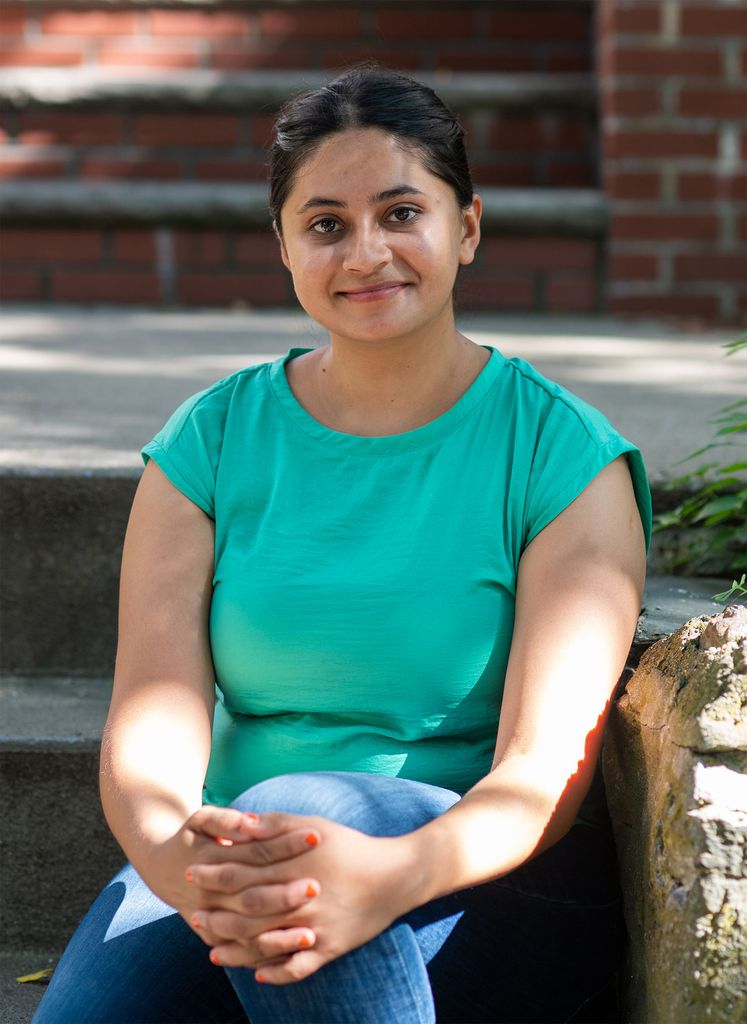
“I’m just glad we had a long ethernet cord,” says Jordan Chambers, who defended her dissertation, in molecular biology and translational medicine, from her Allston apartment bedroom, with the door shut so her two cats couldn’t wander in.
She was grateful, Chambers (MED’20) says, that her grandparents, who live in Ohio and wouldn’t have been able to travel to Boston for her presentation—pandemic or no pandemic—were able to attend online, joining her parents, who had been planning to make the trip from their home in North Carolina, but stayed home because of the coronavirus.
“This is one of the things I would call a silver lining,” says Kyle Pedro (MED’20), who presented his thesis, in microbiology, from the kitchen of his Jamaica Plain apartment. “I could share the link with anyone I wanted. People who were local and might not have been able to take time off to hear me present for an hour, or who might not have been able to travel, could share in this big, momentous day in my life.”
Pedro’s parents tuned in from northern California. “I tasked my sister with teaching them how to use Zoom,” he says. “She made sure they knew how to use the mute button.”
With PhD candidates flashing their presentation slides on the screen from their bedrooms, kitchens, and living rooms, much of the formality of the dissertation defense is gone—and, a lot of students and faculty say, that’s a good thing.
Aqeel wore a silk shirt and sweatpants and perched, cross-legged and barefoot, on a chair in her bedroom. “The formality of the defense makes me a little nervous,” she says. “This was more relaxed.”
“Presenting in person comes with its own challenges,” says Pedro, who wore a button-down shirt over shorts, and like Aqeel, went barefoot. “You’re standing in front of a room full of people. Some people really like that.” He isn’t one of them. “I have a little bit of stage fright,” he says. “That was eased somewhat.”
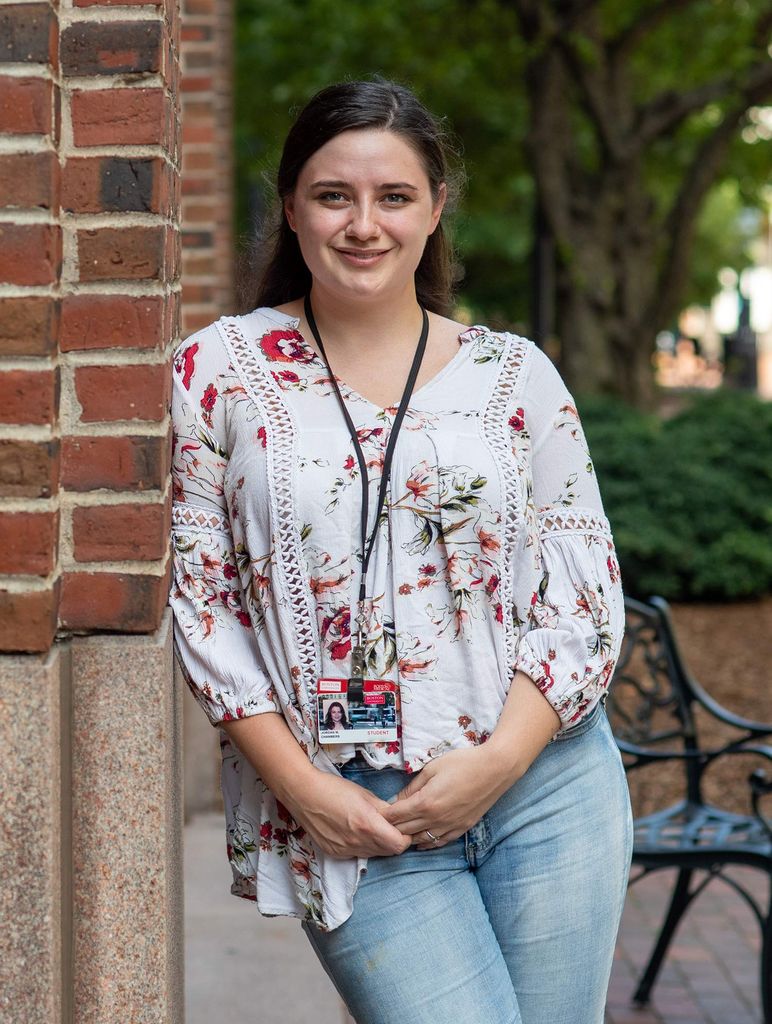
The new Zoom dissertation defense is at once impersonal and more personal than the live, on-campus event. Russek says that faculty are going out of their way to extend themselves online during the defense. “Faculty understand that students are isolated,” she says, “and want to be there for them.”
Chambers says her fiancé, who normally would have been in the audience section of a conference room on the Medical Campus with everyone else, was able to sit right across from her in their bedroom—out of view of the camera and the committee—mouthing encouragement and flashing the thumbs-up while she was delivering her thesis talk in molecular biology and translational medicine.
At the end of March, Richard Giadone presented his dissertation, in molecular biology and translational medicine, from the living room of his one-bedroom apartment in Cambridge, in the custom-made blue suit and bow tie his mentor, George Murphy, codirector of the Center for Regenerative Medicine (CReM), had bought for him back in December. Giadone (MED’20), who grew up in Dracut, Mass., and graduated from the University of Massachusetts Lowell, is the first person in his family to graduate from college, let alone earn a PhD. As is Murphy, a MED associate professor of medicine. Tradition matters, Murphy says.
“When we heard it was going to be a Zoom defense,” Murphy recalls, “we said, ‘You’re still wearing the suit.’”
As things turned out, COVID-19 didn’t leave Giadone much time to prepare for his big moment. Two weeks before, on the same day he turned in his 150-page thesis, Murphy had texted him at four am: “I know you have to study for your thesis defense and everything, but we need to help BMC [Boston Medical Center] develop in-house COVID testing.”
With cases of the coronavirus surging in Massachusetts, Murphy and Giadone and a team of other researchers raced to turn CReM into a same-day COVID-19 testing development lab. After close to three hours online for his defense, the newly minted Dr. Giadone, forgetting he was still in his suit, drove to the lab. It was the first day testing samples were available for use.
“That was my baby,” Giadone says. “I wasn’t going to miss that.”
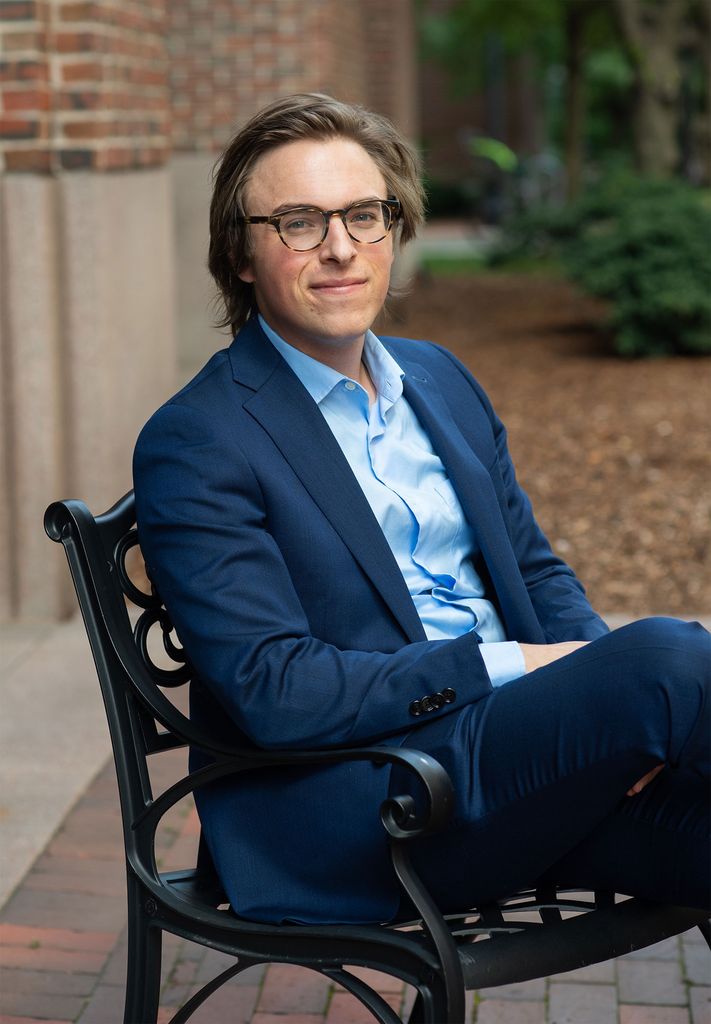
With the party canceled, Murphy didn’t get to deliver the short speech he had prepared for Giadone. He had planned to open by recalling what he had said to Giadone early in his PhD career, when Giadone had already established himself as a gifted student:
“‘You’re doing great, and there won’t be a problem with you meeting expectations and being granted your PhD. But…you won’t be remembered. You won’t be legendary. Be legendary.’
“So, first of all, who actually says something like that to someone? And even more shockingly, who takes those words to heart and not only fulfills the prophecy, but actually finds a way to exceed it? Richard Giadone.”
Instead of a party with Murphy and the other members of his lab and his family and friends, Giadone kicked back at home with his girlfriend, who is also a scientist. “We watched a lot of reality TV,” Giadone says.
Back in Manila, it was after midnight when Vogel’s dissertation committee pronounced him “Dr. Vogel.”
“He knocked it out of the park,” recalls one of his dissertation committee members, Steve Ramirez (CAS’10), a College of Arts & Sciences assistant professor of psychological and brain sciences. “It was inspiring to see such poise despite the otherwise exceptional circumstances surrounding his defense.”
“I thanked everyone and just enjoyed the moment,” Vogel says. Now that he had his PhD, he had another hurdle to overcome: getting back to Boston. With the lockdown stretching on in the Philippines, it would take him another two and a half months before he could score a seat on a flight out of Manila.


Comments & Discussion
Boston University moderates comments to facilitate an informed, substantive, civil conversation. Abusive, profane, self-promotional, misleading, incoherent or off-topic comments will be rejected. Moderators are staffed during regular business hours (EST) and can only accept comments written in English. Statistics or facts must include a citation or a link to the citation.